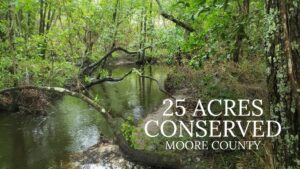
by Crystal Cockman
February 6, 2017
 While at the Pee Dee Wildlife Refuge in Anson County a few years ago, during a meeting of the Greater Uwharrie Conservation Partnership, we spotted an interesting species, thought to be out of its natural range – the wood stork (Mycteria americana). There were four of them, all juvenile, and they were perched on some of the dead standing trees in a marshy area.
While at the Pee Dee Wildlife Refuge in Anson County a few years ago, during a meeting of the Greater Uwharrie Conservation Partnership, we spotted an interesting species, thought to be out of its natural range – the wood stork (Mycteria americana). There were four of them, all juvenile, and they were perched on some of the dead standing trees in a marshy area.
The wood stork is the only stork species found in North America. It was formerly called the wood ibis, but it is not an ibis. Their head resembles that of an ibis, which is where they got the former name. They are white with black-gray legs and pink feet, and their head is dark brown with a bald gray to black face and neck. They are approximately 45 inches tall with a wingspan of 5 feet. They have a long bill, up to ten inches in length, and it is curved. Unlike herons, they fly with their neck stretched out.
They are found in the Carribean, Central and South America, and in North America north to North Carolina and west to Mississippi. They breed in Florida, Georgia and South Carolina. Wood storks are found in marshy habitats, in coastal areas, tidal pools, swamps, and mangroves. They eat fish, frogs, mollusks, snails, and insects. The wood storks hunts with its bill open in the water, and when it feels prey it quickly closes its mouth shut. The average response time is 25 milliseconds, making it one of the fastest reflexes among vertebrates. Wood storks breed in the late winter dry season in Florida, when fish congregate in shrinking pools.
Wood storks nest in colonies, building stick nests in trees. There may be as many as 25 nests in a single tree. Wood stork pairs often mate for life, and may return to the same nesting site year after year. Both the male and female build the nest and care for the young. The everglades in Florida are the stronghold of the breeding population in the United States. In drought years, which have been more frequent as of late, raccoons as the top predator of juvenile wood storks can more easily access the nests. Adult wood storks do not have a major predator; though can be taken by alligators.
Once classified as endangered (listed in 1984), they were upgraded in 2014 and are now classified as a threatened species by the U.S. Fish and Wildlife Service. The southeast breeding population declined from 20,000 pair in the 1930s to about 5,000 pair in the late 1970s. Since 2004, the number of nesting pairs has remained above 6,000. The current estimated breeding population is believed to be greater than 8,000 pairs.
Restoring wetlands has been key to the increased number of wood storks found, especially as it expanded its range into North Carolina and Mississippi. Habitat loss due to wetland destruction and changes in water regimes by construction of levees and canals that alter water flow, invasive species, and pollution still threaten the species. Pythons, an invasive species in the everglades, are one source of pressure on the species. Pesticides and mercury accumulating in fish is also responsible for the death of some wood storks. To ensure wood storks remain off the endangered list, preserving their habitat both for breeding and foraging should be one key endeavor.